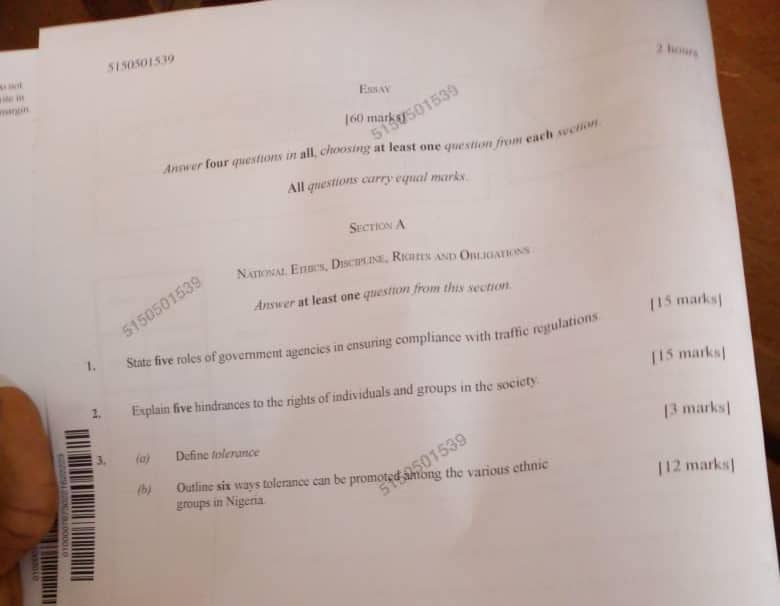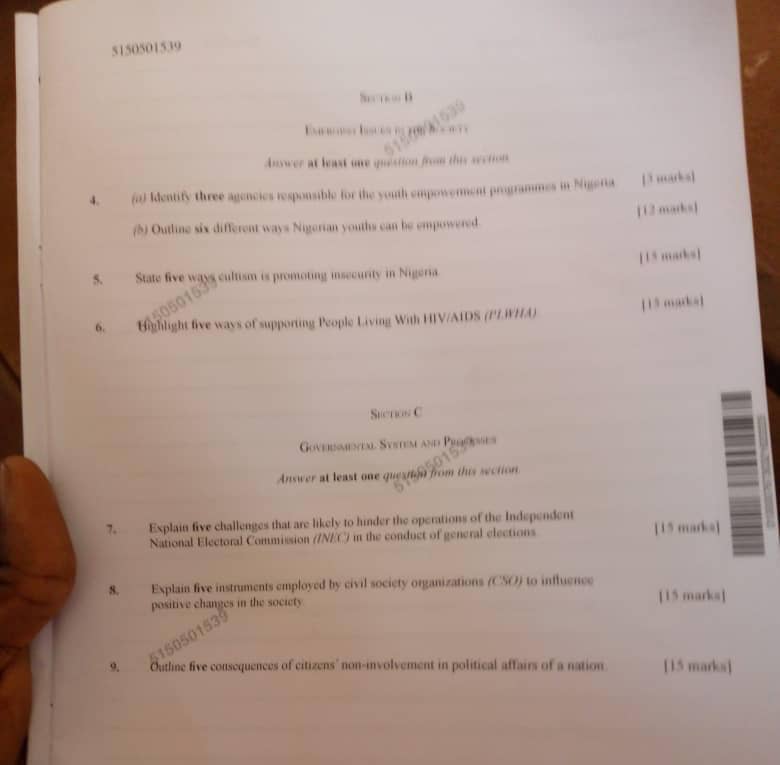TODAY ANSWERS ON 2023 WAEC GCE CRS/IRS Exam Answers….. 2023 WAEC GCE CRS OBJ AND THEORY ANSWERS WE BE UPLOADED HERE….
The Time Of 2023 WAEC GCE CRS PAPERS
Wednesday, 29th November, 2023
Christian Religious Studies 2 (Essay) – 9:30am – 11:30am
Christian Religious Studies 1 (Objective) – 11:30am – 12:30pm
Islamic Studies 2 (Essay) – 9:30am – 11:30am
Islamic Studies 1 (Objective) – 11:30am – 12:20pm
A. 2023 WAEC GCE CRS/IRS (ESSAY) ANSWERS
Kindly bookmark the website for the answers that will be released here, or better still reload the site to check if the answers for the 2023 Waec GCE CRS/IRS Questions and Answers have dropped.
2023 2023 WAEC GCE GCE CRS/IRS Essay Answers
Loading………………………………………………..
B. 2023 WAEC GCE CRS/IRS OBJECTIVES (OBJ) ANSWERS
Kindly bookmark the website for the answers that will be released here, or better still reload the site to check if the answers for the 2023 Waec GCE CRS/IRS Questions and Answers have dropped.
WAEC GCE GCE CRS/IRS Answers
Loading…………………………..
Take a look at some of the 2023 WAEC GCE questions and answers we’ve already provided for Civic Education below. Many students/candidates who regularly visit our site find helpful answers for the Civic Education subjects. You too can get yours for free on CRS/IRS.


2023 WAEC GCE CIVIC EDUCATION – 18th Nov. 2023
(2)
(PICK ANY FIVE)
(i) Discrimination and Prejudice: Discrimination based on factors such as race, ethnicity, gender, religion, sexual orientation, or socio-economic status can hinder individuals and groups from fully enjoying their rights. Prejudiced attitudes contribute to unequal treatment and opportunities.
(ii) Social and Economic Inequality: Widening gaps in wealth and social status create disparities in access to education, healthcare, employment, and other essential services. Economic inequality can limit the ability of certain groups to exercise their rights fully.
(iii) Lack of Access to Education: Inadequate access to quality education can hinder the realization of individual and group rights. Without education, individuals may struggle to fully participate in social, economic, and political aspects of society.
(iv) Political Repression and Lack of Civic Engagement: Suppression of political freedoms, restrictions on free speech, and limited civic engagement can impede the ability of individuals and groups to voice their concerns and participate in decision-making processes.
(v) Injustice in Legal Systems: Biased legal systems, corruption, and lack of access to justice can undermine individuals’ and groups’ rights. Unequal application of the law can perpetuate injustice and hinder the protection of fundamental rights.
(vi) Violence and Conflict: Individuals and groups living in areas affected by violence, conflict, or persecution often face severe hindrances to their rights. Armed conflicts can lead to displacement, loss of life, and violations of basic human rights.
(vii) Cultural and Religious Practices: Certain cultural or religious practices may conflict with universal human rights standards. Traditional norms that discriminate against specific groups, such as women or minorities, can hinder the full enjoyment of their rights.
(viii) Lack of Legal Protections and Enforcement: Inadequate legal frameworks and weak enforcement mechanisms contribute to the violation of rights. Without effective legal protections, individuals and groups may be left vulnerable to abuse and exploitation.
2023 WAEC GCE CIVIC EDUCATION
(1)
(i) Traffic Law Enforcement: Government agencies, such as the Federal Road Safety Corps (FRSC) and state traffic management authorities, are responsible for enforcing traffic laws. They conduct regular patrols, set up checkpoints, and take necessary actions against traffic violators.
(ii) Issuing Traffic Citations and Penalties: Agencies issue traffic citations and penalties to individuals who violate traffic regulations. This serves as a deterrent and encourages compliance with road safety rules.
(iii) Public Education and Awareness: Government agencies conduct public education campaigns to raise awareness about traffic regulations, safe driving practices, and the consequences of non-compliance. This includes media campaigns, road safety workshops, and community outreach programs.
(iv) Road Safety Inspections: Agencies carry out road safety inspections to ensure that vehicles comply with safety standards. This includes checking for proper documentation, roadworthiness, and adherence to vehicle specifications.
(v) Traffic Control and Management: Government agencies are responsible for the design and implementation of traffic control measures, such as traffic signals, road signs, and markings. Proper traffic management helps regulate the flow of vehicles and pedestrians, reducing the risk of accidents.
(vi) Accident Investigation and Reporting: Agencies investigate road accidents, gather data, and generate reports to understand the causes of accidents. This information is used to improve road safety policies, infrastructure, and public awareness campaigns.
(vii) Licensing and Vehicle Registration: Government agencies oversee the process of licensing drivers and registering vehicles. This ensures that only qualified individuals operate vehicles on the road and that vehicles meet safety standards.
(viii) Infrastructure Development and Maintenance: Government agencies are involved in the planning, development, and maintenance of road infrastructure. Well-designed and properly maintained roads contribute to safer driving conditions and reduce the likelihood of accidents.
2023 WAEC GCE CIVIC EDUCATION
(3a)
(PICK ANY ONE)
Tolerance refers to the ability to accept, respect, and coexist with opinions, behaviors, or characteristics that differ from your own without prejudice or hostility.
OR
Tolerance refers to the willingness to recognize and respect the rights, beliefs, practices, and differences of others, promoting harmony and understanding within a diverse society. It involves accepting and valuing diversity while peacefully coexisting despite differing viewpoints or backgrounds.
(3b)
(PICK ANY SIX)
(i) Education and Awareness: Implementing inclusive curricula that highlight Nigeria’s diverse cultures, histories, and traditions to foster understanding and respect among different ethnic groups.
(ii) Interethnic Dialogue and Collaboration: Encouraging open discussions, forums, and community events that facilitate dialogue, promote understanding, and address misconceptions or stereotypes between ethnic groups.
(iii) Government Policies: Implementing inclusive policies that ensure equal representation and participation of all ethnic groups in governance, public institutions, and decision-making processes.
(iv) Cultural Exchange Programs: Organizing cultural events, exchanges, and initiatives that celebrate the diversity of Nigeria’s ethnic groups, fostering appreciation and mutual understanding.
(v) Conflict Resolution Mechanisms: Establishing effective conflict resolution mechanisms at local and national levels to address disputes peacefully and prevent escalation along ethnic lines.
(vi) Media and Communication: Encouraging responsible and inclusive media representation that portrays the richness of Nigeria’s ethnic diversity and avoids perpetuating stereotypes or prejudices.
(vii) Promoting National Identity: Emphasizing common national values and identities that transcend ethnic differences, fostering a sense of unity and belonging among all Nigerians.
If you’re unsure whether the questions and answers you’ve seen are the actual 2023 WAEC GCE questions and answers, consider verifying with your friends who took the exam. Ask them to share their Government questions, and then compare them with the answers we’ve provided to ensure accuracy.
You can Join our WhatsApp here.
Kindly bookmark this website for quick access to the released WAEC GCE CRS/IRS answers. Alternatively, you can reload the site periodically to check if the answers for the 2023 WAEC CRS/IRS questions have been posted. Stay tuned for the latest updates.

